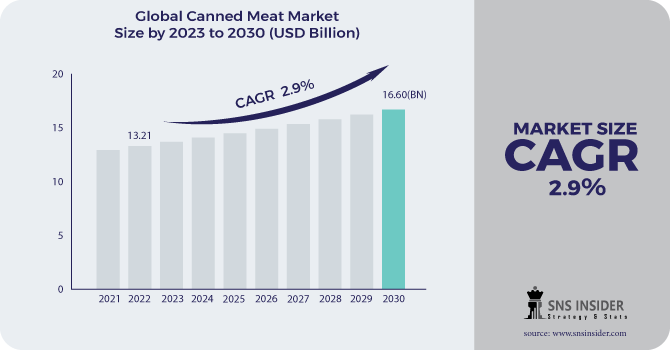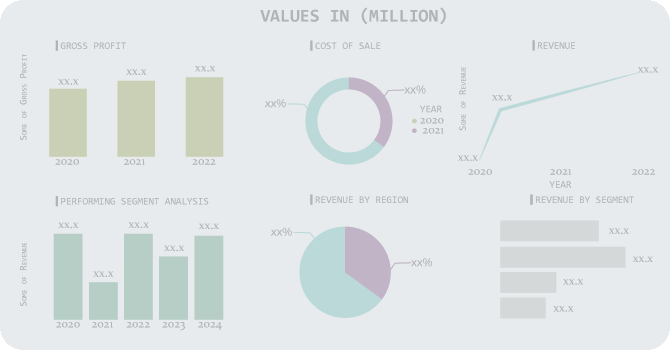Canned Meat Market Report Scope & Overview:
The Canned Meat Market size was valued at USD 13.6 Billion in 2023 and is expected to reach USD 17.6 Billion by 2032 and grow at a CAGR of 2.9% over the forecast period of 2024-2032.
Canned meat is new and prepared-to-eat meat, safeguarded in cold stockpiles. Canned meat contains proteins, omega-3 unsaturated fats, filaments, and other sustenance that are fundamental for a fair eating routine. The rising well-being cognizance of individuals has driven them to favor canned meat. Among the different assortments of meat, poultry meat has the most elevated piece of the pie. It tends to be stocked up for a more drawn-out period and is simple to store. Canned meat is given with all relevant information about the item’s fixings and expiry date.

The canned meat market comprises deals of canned meat by elements (associations, sole brokers, and organizations) that allude to the new and prepared to eat meat, safeguarded in cool capacity. Canned meat contains proteins, omega-3 unsaturated fats, strands, and different supplements that are fundamental for a fair eating regimen. Individuals pick canned meat since it tends to be put away for a more extended measure of time and is simpler to protect.
The principal sorts of items in canned meat are fish meats, poultry meats, red meat, and different items. Poultry meat alludes to canned meat of chicken, goose, duck, turkey, game birds, and hare which includes freezing the meat in time at explicit temperatures. It is appropriated through general stores and hypermarkets, specialty stores, on the web, and other dissemination diverts and is utilized in a few applications like confidential use, business, and modern use.
Bar Harbor Foods - While there are genuine individuals that eat whole sticks of margarine as a bite (or world record endeavor), spread-enhanced frozen yogurt doesn't seem like the typical kind of frozen yogurt somebody would attempt. Particularly while adding real lumps of lobster meat into said frozen yogurt.
Market Dynamics:
Driving Factors:
-
Immediately made food options
-
Great wellspring of protein
Restraining Factors:
-
Unfriendly well-being impacts caused because of incessant utilization
Opportunities:
-
The dynamic and quick way of life of shoppers credited to the fast urbanization
-
The youthful age as well as the common populace request prepared to-eat food, yet in addition supplement one-of-a-kind taste.
Challenges:
-
Overconsumption of meat can cause heftiness and overweight, prompting specific illnesses.
Impact of Covid-19:
The worldwide canned meat market emphatically affects the market notwithstanding the COVID-19 pandemic. The meat utilization examples of purchasers have changed during the pandemic. With the rising contaminations and the limitations and the limitations forced on movement, the clients are searching for items with a longer period of usability. The interest in prepared-to-eat food items soars during the COVID-19 pandemic, particularly among the customers that are not attached to preparing food. Customers pursuing the direction of telecommuting or remaining at home favored prepared-to-eat food as it is not difficult to plan and takes negligible time. Also, the offer of canned items, especially canned fish, expanded as the long period of usability of such items spoke to purchasers who were exposed to home isolations, administrative measures confining simplicity of development and different effects of government lockdowns.
By Meat Type:
Given the type, the market is divided into hamburgers, pork, poultry, and others.
The utilization of hamburgers is high in South East Asian nations, North America, and South America. Besides, hamburger meat cost is nearly higher than poultry meat and pork meat, subsequently, the hamburger section overwhelms the piece of the pie. The rising interest in poultry items is one of the critical elements adding to the development of this fragment. Since chicken meat is reasonable and doesn't have social hindrances like pork and hamburger, the interest in these items increments altogether. Poultry items have top-notch protein and low-fat levels, which additionally add to the expanded utilization of poultry meat.
By Distribution Channel Analysis
Online Retail Channels Segment to Exhibit Fastest Growth. The general stores/hypermarkets portion holds a prevailing piece of the pie in the worldwide market. The main consideration adding to the section's development is the accessibility of numerous items that furnish the customers with the plentiful decision. Rack course of action of the item and higher accessibility of food items in these stores additionally support the portion's development.
The deals of canned food items through internet-based channels would rise altogether during the estimated time frame. Since online channel gives the accommodation to buy food items from the solace of home, the more youthful populace with a more occupied way of life would be the most elevated buyer utilizing these channels. Moreover, the key part is opening their internet business entries to contact clients.
Key Market Segmentation:
By Meat Type:
-
Beef
-
Seafood
-
Poultry
-
Pork
-
Others
By Distribution Channel:
-
Supermarket & Hypermarket
-
Specialty Store
-
Online
-
Others
.png)
Regional Analysis:
-
North America
-
USA
-
Canada
-
Mexico
-
-
Europe
-
Germany
-
UK
-
France
-
Italy
-
Spain
-
The Netherlands
-
Rest of Europe
-
-
Asia-Pacific
-
Japan
-
south Korea
-
China
-
India
-
Australia
-
Rest of Asia-Pacific
-
-
The Middle East & Africa
-
Israel
-
UAE
-
South Africa
-
Rest of Middle East & Africa
-
-
Latin America
-
Brazil
-
Argentina
-
Rest of Latin America
-
Asia-Pacific is the quickest developing area for canned meat, especially canned fish/fish and organic products. Canned crab meat is vigorously imported by nations like Japan, Korea, and China. Besides, the food presence of significant general stores like 7-Eleven, E-shop, Big C, and others, as well as the rising web infiltration, and online market for the acquisition of canned meat items, are driving the business sector development. The nation part of the canned meat market report additionally gives individual market affecting elements and changes in the guideline in the market locally that influences the current and future patterns of the market. The information focuses, for example, on utilization volumes, creation locales and volumes, import sends out an investigation, cost pattern examination, cost of unrefined components, downstream and upstream worth chain examination are a portion of the significant pointers used to conjecture the market situation for individual nations. Furthermore, the presence and availability of overall brands and their moves looked on account of tremendous or insufficient contention from neighboring and local brands, the impact of local charges and shipping lanes are considered while giving figure investigation of the nation information.
Key Players:
JBS, Hormel Foods Corp., Tyson Foods, Inc., Wild Planet Foods, Bolton Group, Vion Food Group, Mundella Foods, Campbell Soup Company, Smithfield Foods, Valleyfresh Global.
Tyson Foods, Inc-Company Financial Analysis

| Report Attributes | Details |
|---|---|
| Market Size in 2023 | US$ 13.6 Billion |
| Market Size by 2032 | US$ 17.6 Billion |
| CAGR | CAGR 2.9% From 2024 to 2032 |
| Base Year | 2023 |
| Forecast Period | 2024-2032 |
| Historical Data | 2020-2022 |
| Report Scope & Coverage | Market Size, Segments Analysis, Competitive Landscape, Regional Analysis, DROC & SWOT Analysis, Forecast Outlook |
| Key Segments | • by Product Type (Seafood Meats, Poultry Meats, Red Meat, and Other Product Types) • by Distribution Channel (Off-Trade and On-Trade) |
| Regional Analysis/Coverage | North America (USA, Canada, Mexico), Europe (Germany, UK, France, Italy, Spain, Netherlands, Rest of Europe), Asia-Pacific (Japan, South Korea, China, India, Australia, Rest of Asia-Pacific), The Middle East & Africa (Israel, +D11UAE, South Africa, Rest of Middle East & Africa), Latin America (Brazil, Argentina, Rest of Latin America) |
| Company Profiles | JBS, Hormel Foods Corp., Tyson Foods, Inc., Wild Planet Foods, Bolton Group, Vion Food Group, Mundella Foods, Campbell Soup Company, Smithfield Foods, Valleyfresh Global |
| Key Drivers | •Immediately made food options. •Great wellspring of protein. |
| Market Challenges | •Overconsumption of meat can cause heftiness and overweight, prompting specific illnesses. |

